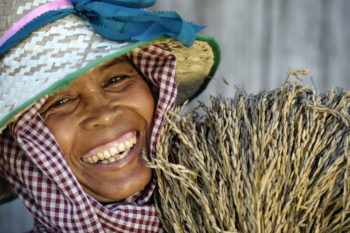
For centuries, and especially over the last few decades, landscapes around the world have changed. Deforestation and industrialized agriculture have spread, transforming land use and planning. A new report on Climate Change and Land from the Intergovernmental Panel on Climate Change (IPCC) which launched today, stresses that time is ripe for a new transition, but it must happen fast!
Land, the place where we live, work and produce our food is part of the solution but also the problem. It contributes to the solution because trees and soil sequester Carbon Dioxide (CO2), which absorbs some of the CO2 emissions out of the atmosphere. In the coming years, I would like to see trees and forests planted in all countries of the world, as quickly as possible. An example of this is already happening in Ethiopia, where a national campaign encourages its citizens to plant millions of trees.
The reality is that land is also contributing to the problem. Emissions from agriculture constitute a major part of global greenhouse gas (GHG) emissions, and the science to support this is clear. With an increasing global population, sustainable food production is a requirement for slowing down climate change.
But what is sustainable agriculture? Well, there are many different techniques and approaches, and the solutions will differ between regions and countries. As we concern ourselves with emissions from agricultural activities, for example, methane, a strong greenhouse gas, we must also unpack food consumption habits, such as food waste. During the launch of the report, listeners were reminded that both farmers and consumers can contribute to the solutions.
For ACT Alliance, the IPCC chapter on food security is of particular concern. Food security is heavily impacted by increasing temperatures and is projected to affect nutrition, yields and eventually food prices, all which will disproportionately affect the poorest communities around the world.
These projections were further noted by ACT Alliance member Christian Aid in a recent report titled, Hunger Strike: The climate and food vulnerability index. The report finds that some of the countries that are tackling severe issues around food security are also countries with low GHG emissions. This suggests that those who have contributed the least to global warming are experiencing some of the most dangerous effects, and this is unfair.
God gave humans the task to care for creation. Caring for our land is a critical element of this task, and the size of this task is increasing as climate change intensifies. We must act now to make sure that climate change does not reach a point of no return. We should care for creation, and we should do whatever we can to transform our livelihoods so that our planet is more sustainable and resilient for all. We need climate justice!
The IPCC report on land and climate change is available here.
___________________________
 Mattias Söderberg, Senior advocacy advisor at DanChurchAid. Co-chair of the ACT Alliance Climate Change Working Group.
Mattias Söderberg, Senior advocacy advisor at DanChurchAid. Co-chair of the ACT Alliance Climate Change Working Group.